Memo Published April 21, 2025 · 8 minute read
Growing the Coalition: Non-College Men and the Clean Energy Transition
Mary Sagatelova & Emily Becker

For too long, climate groups and associated policymakers have centered their arguments on environmentalism, focusing on how clean energy can fight climate change and protect the environment. While most Americans care about climate change and environmental protection, those interests take a backseat to pocketbook issues and cost-of-living anxieties. If voters are presented with a choice between deploying clean energy to address climate change and, for example, expanding natural gas production to reduce energy costs, they’re going to choose natural gas to cut energy costs.
Voters prioritize economic issues, but too often, clean energy messaging ignores that reality. Last year, our team shed light on this disconnect between clean energy advocates and everyday Americans. In 2025, we are focused on understanding how non-college men are thinking about energy issues, their broader economic concerns, and how to build a clean energy agenda that addresses their needs and values. Our research explores what men without college degrees believe about clean energy, dissects why they believe it, and identifies strategies to persuade them to support clean energy technologies and their advocates.
Below, we offer context on the political and practical centrality of non-college men to the energy transition and set the stage for the research ahead.
In an ideal world, clean energy would be a nonpartisan issue. But given that many Republicans are reluctant to speak up or show support, it has become a solidly Democratic issue. To expand support for clean energy, our analysis will offer new messaging strategies for Democrats to reach untapped audiences and expand the clean energy coalition to include non-college-educated men.
The Diploma Divide
The Political Salience of Non-College Men
Voting Patterns
The divide between college-educated and non-college-educated voters has become one of the most powerful forces reshaping modern American politics. Over the past decade, non-college voters have moved decisively to the right, destabilizing long-standing political coalitions and challenging standing assumptions about how class, race, and culture inform partisanship. While race, region, and religion still impact voters’ political leanings, education has become an increasingly significant driver and, for some issues, is more determinative of voter perspective than other factors like race or income.
Voters are also increasingly divided by gender: men are significantly more likely to support Republican candidates and hold corresponding political beliefs than women. And the gender divide cuts across races. In 2024, white men were 7 points more likely to vote for Trump than white women. Among black and Latino voters, the divide was even wider—14 and 15 points, respectively.
The combined impact of these two forces—growing gaps in voting behavior based on education and gender—poses a serious electoral challenge for Democrats in the coming years. Non-college-educated men make up approximately 25% of the electorate in 2024. 65% of battleground voters, roughly half of whom are men, do not have a college degree. As this group grows more conservative, Democrats’ path to victory in presidential elections and other key races gets narrower, unless and until the party finds a way to reach non-college Americans, especially non-college men.
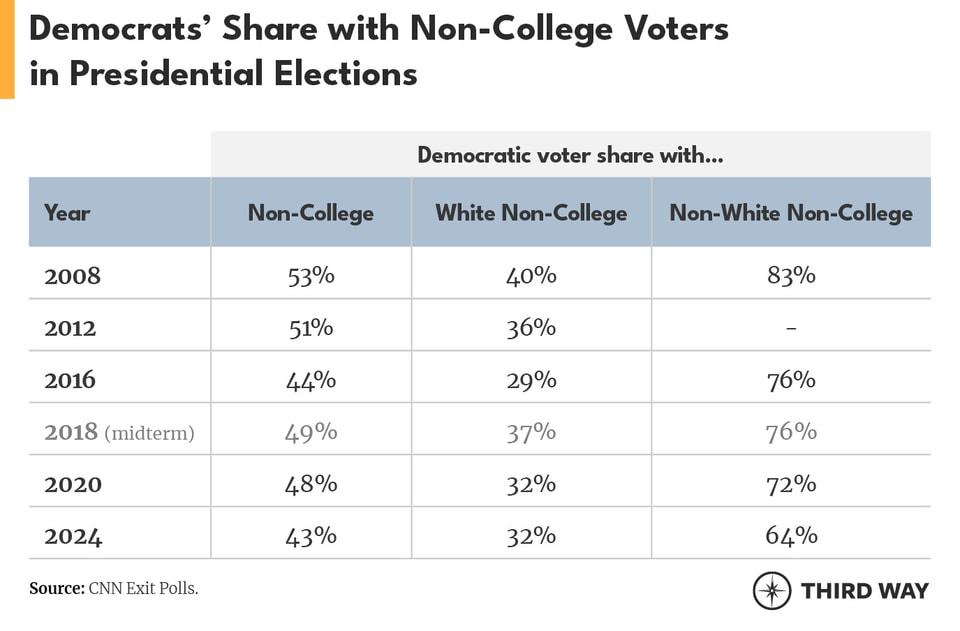
We can trace the erosion of Democratic support among non-college men over the past 20 years: 61% of non-college men voted for Donald Trump in the 2024 election, compared to 47% of men with college degrees and 52% of non-college women. In the 2020 presidential election, just 57% percent of non-college men voted Republican.
Non-College Men and Clean Energy
While non-college men increasingly vote Republican, their beliefs about energy and climate change don’t align with conservative orthodoxy on these issues. Overall, non-college men hold broadly favorable views of clean energy (81%), and support is strong for solar (82%), wind (71%), and even EVs (57%). A slightly narrower majority backs nuclear (52%).
Herein lies the irony: men without college degrees support clean energy in theory, but vote for politicians who block clean energy in practice. This seemingly contradictory behavior can be explained, in part, by examining the core political priorities and values of non-college men. In our most recent survey, a plurality of non-college men (31%) rank inflation and high costs as their top issue facing the country today. Just 4% list climate change as their top concern. When asked about priorities for the energy sector, non-college men cite costs, reliability, and stability as core issues.
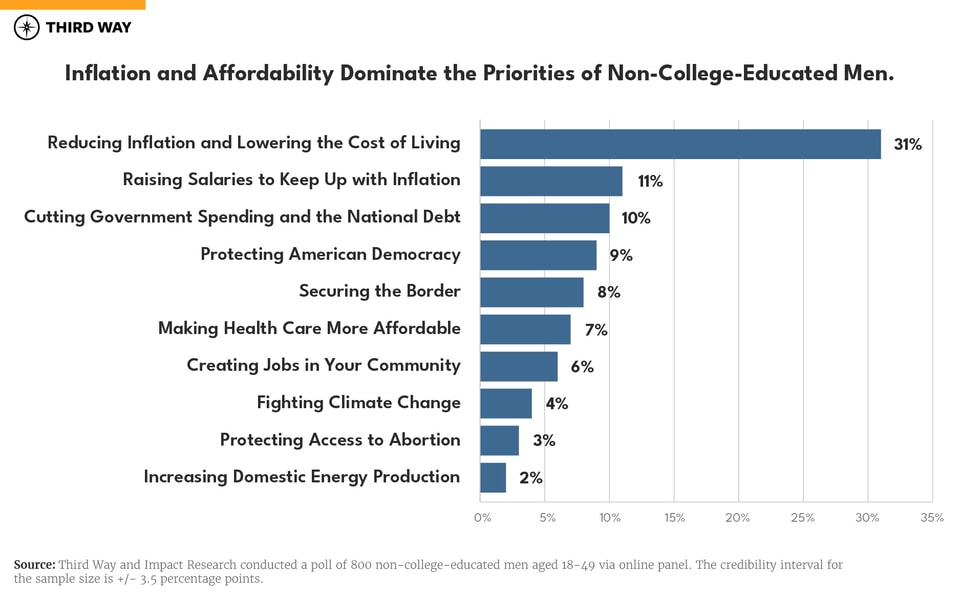
Though non-college men see some clean energy technologies as reliable, most are still seen as less reliable than fossil fuels, and none are considered more reliable than natural gas. More than half of non-college men feel we should drill the same amount or more in the immediate future. Clean energy is widely (and inaccurately) perceived to cost more than fossil fuels, and non-college men display tremendous cost sensitivity when it comes to energy prices. In our survey, less than half (40%) said they would pay a monthly fee on their energy bill to fund clean energy buildout.
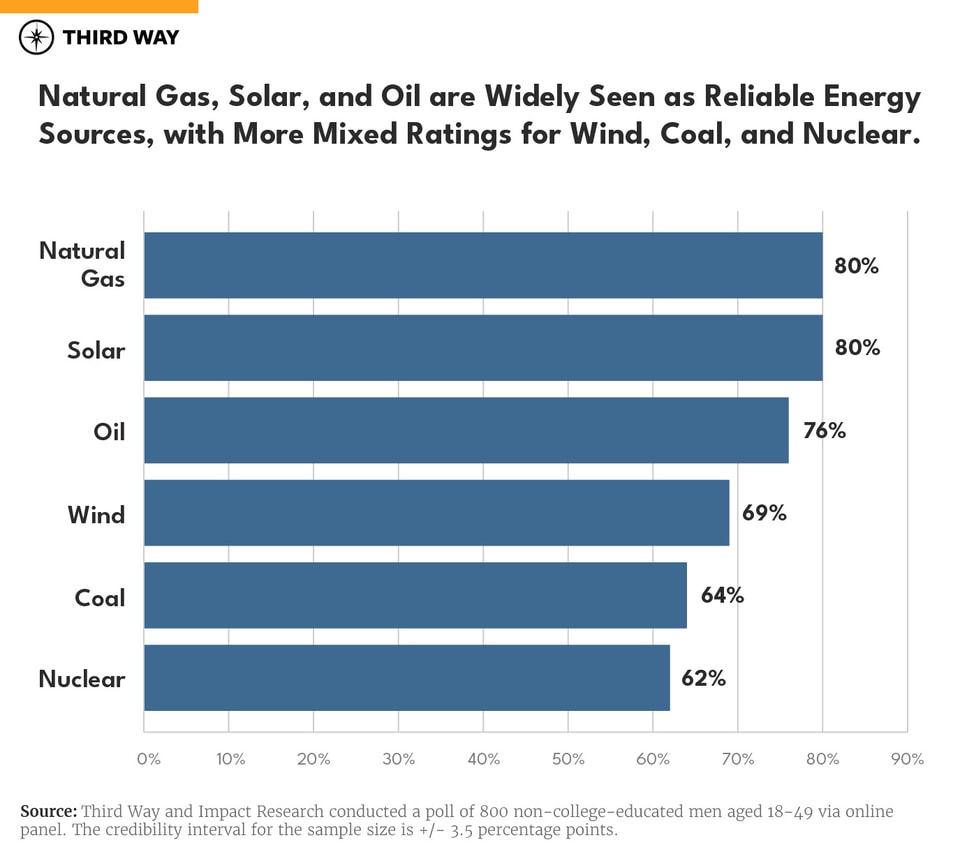
Taken together, this data suggests that, while they aren’t hostile to clean energy, non-college men do not believe it performs better on core metrics (reliability, cost, stability) than fossil fuels. If that is the case, then these men have little reason to advocate for clean energy or vote to protect it.
In a question comparing an anti-clean energy message focused on high costs with pro-clean energy arguments, the anti-clean energy costs message won every time against all counter-arguments. While non-college men recognize that clean energy has benefits, those benefits don’t outweigh their concerns about high costs and economic impacts.
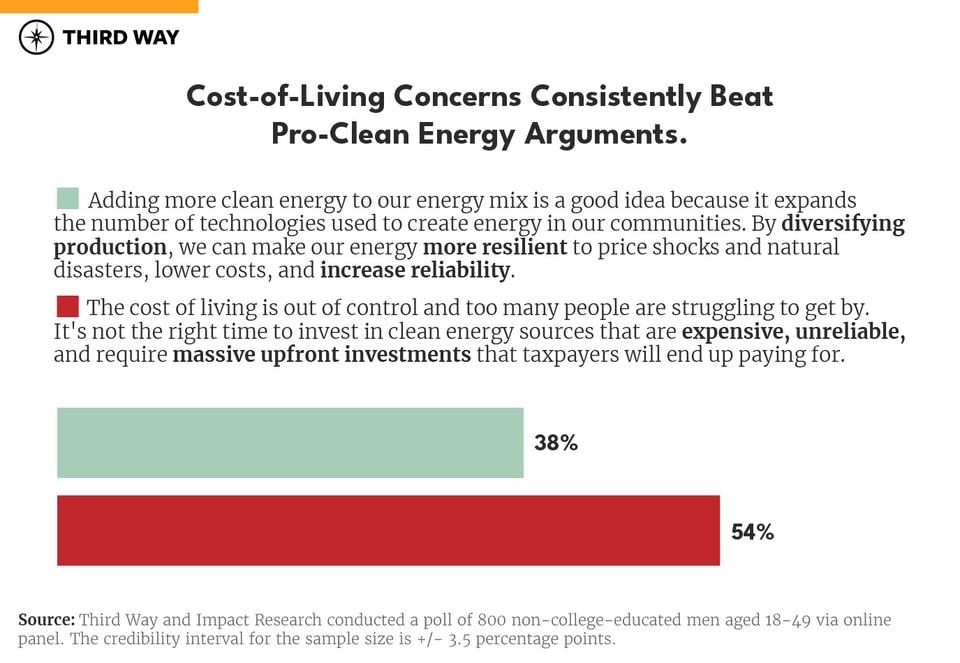
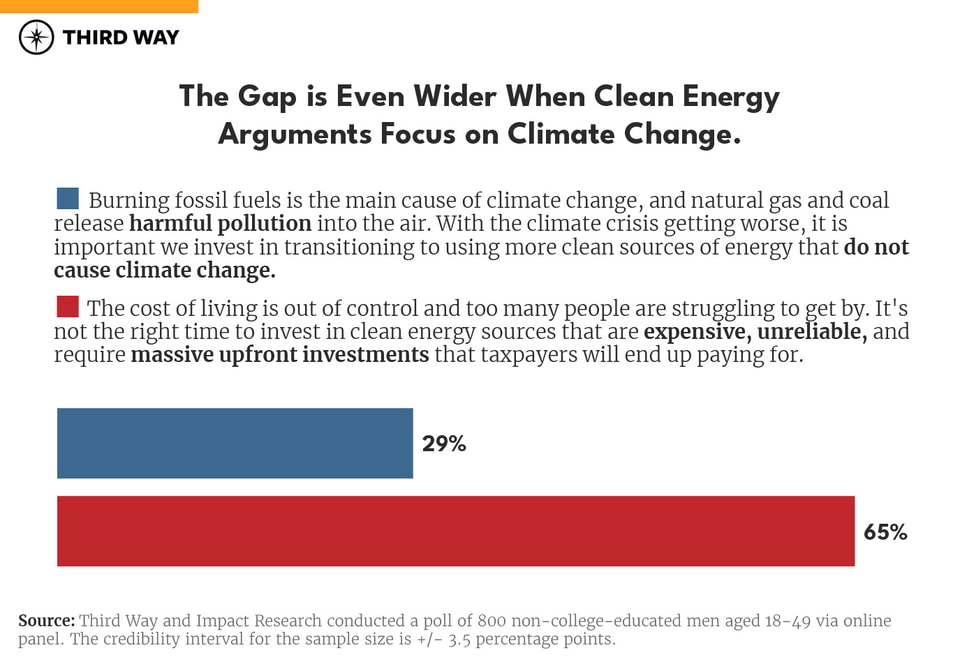
Non-college men support these technologies, but that support is soft and fails to influence voting behaviors. Building durable support for clean energy will require demonstrating to non-college men how clean energy can better address their needs and priorities than fossil fuels.
Non-College Men in the Energy Transition
There is also a practical reason to reach out to non-college men on clean energy. Many non-college men already work in or alongside industries central to the clean energy transition, including construction and manufacturing. 74% of all energy jobs are held by men, and those roles are increasingly in clean energy. Men without college degrees are the backbone of the clean energy transition. It will be extremely difficult if not impossible to move forward without their buy-in.
While some will be able to step directly from existing construction, manufacturing, or energy sector roles into clean energy jobs with the skills they already have, many will need to retrain. By some estimates, 60% of clean energy jobs will require candidates to retrain. That means new certifications, new tools, and serious time and—in some cases financial—commitments for workers. It is both unreasonable and impractical to ask professionals to retrain for jobs that they do not believe can provide a stable future for themselves and their families.
Academic research suggests that may be exactly what’s happening in the clean energy space. In a survey of labor union members and leaders, participants were more skeptical of the energy transition if their skill set did not overlap with the skills needed to transition to clean energy. Participants expressed disinterest in retraining, with one man summing up his position as follows:
“I saw [a solar panel installation training program] last year, then looked at the pay. I'm like, ‘Yeah, that's cool if you're younger, really young,’ but if you've already got a family…you wouldn't take that right now. So, it has to be enticing. That doesn't look enticing right now.”
Retooling clean energy messaging to engage men without college degrees and overcome skepticism is not optional—it is foundational to the energy transition. In a time of low unemployment, many workers will have to leave existing jobs to work in clean energy. There is an inherent risk in that decision, which clean energy advocates must acknowledge and help mitigate. Messaging aimed at non-college men—the core labor pool for clean energy projects—must reduce skepticism about the long-term viability of the industry and build confidence in its benefits for workers and their communities.
Conclusion
Building confidence in clean energy technologies among non-college-educated men is not just important—it’s essential. Without their support, we cannot create the political coalition needed to move clean energy policies forward. And we cannot develop, manufacture, and deploy vital clean energy technologies without their hard work. Their buy-in is essential, but environmental groups and others on the Left have long failed to communicate with non-college men in a compelling, grounded way.
Our research this year will explore the best strategies to reach this critical constituency on clean energy issues, increasing support for clean energy to make the transition more politically popular and practically viable.
Methodology
From February 18-25, 2025, Third Way and Impact Research conducted polling via an online panel of 800 non-college-educated men aged 18-49, with a +/- 3.5 credibility interval. We also conducted four virtual focus groups from January 29-30, 2025 among men without college degrees nationwide. Groups consisted of white men ages 18-27, white men ages 28-40, Black men ages 18-40, and Hispanic men ages 18-40. All participants were swing voters not firmly committed to either party.

